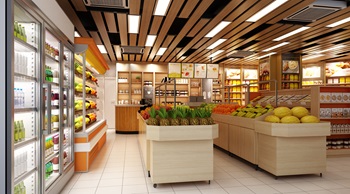By: Rebecca Daniels, Director, Education, FMI
As the last few years have shown, it’s an ever-evolving operational climate for doing business. Food retailers building new stores or remodeling existing locations are simultaneously dealing with supply chain challenges and the drive toward sustainability.

Just as retailers have had to circumvent delays and shortages in products that they sell to consumers, they faced similar internal circumstances when designing and outfitting their stores. Sourcing materials and resources from both domestic and global suppliers is often tricky, as the pandemic, war in Ukraine, weather events, high shipping costs and other conditions led to difficulties receiving materials such as electrical components, lumber, paint and cement. The human component added another layer of difficulty, with labor challenges in the construction industry spurring more demand for fewer workers.
At the same time, the prioritization of Environmental Social and Governance (ESG) programs has elevated sustainable design and construction. Retailers investing in new store construction and store refreshes increasingly incorporate environmentally friendlier elements into their plans. While choosing more sustainable features such as flooring, surfaces, pavement, landscaping and lighting is often done to align with ESG goals, regulations are also causing grocers to investigate and invest in new systems.
For example, the American Innovation and Manufacturing (AIM) Act was proposed to accelerate the phasedown of hydrofluorocarbons (HFCs) and the transition to next-generation technologies for refrigeration, air conditioning insulation and other uses. Given the fact that it can cost more than $1 million per store to transition to a non-HFC cooling system, food retailers are looking at natural refrigerants and other technologies and exploring the EPA’s Green Chill Certification program.
Sorting through what’s required, or will be required, by law and what helps grocery businesses achieve their internally set sustainability targets is a complex process. As retailers weigh their next steps in sustainable design and continue to navigate equally complicated supply chain gaps, they can benefit from educational programs on solving those challenges.
The FMI 2023 Energy & Store Development Conference, held Oct. 2-4 at the Hilton Baltimore Inner Harbor in Baltimore, provides retailers the opportunity to learn about the latest developments and solutions in store construction and remodeling and to connect with peers, experts and business partners.


 Industry Topics address your specific area of expertise with resources, reports, events and more.
Industry Topics address your specific area of expertise with resources, reports, events and more.
 Our Research covers consumer behavior and retail operation benchmarks so you can make informed business decisions.
Our Research covers consumer behavior and retail operation benchmarks so you can make informed business decisions.
 Events and Education including online and in-person help you advance your food retail career.
Events and Education including online and in-person help you advance your food retail career.
 Food Safety training, resources and guidance that help you create a company food safety culture.
Food Safety training, resources and guidance that help you create a company food safety culture.
 Government Affairs work — federal and state — on the latest food industry policy, regulatory and legislative issues.
Government Affairs work — federal and state — on the latest food industry policy, regulatory and legislative issues.
 Get Involved. From industry awards to newsletters and committees, these resources help you take advantage of your membership.
Get Involved. From industry awards to newsletters and committees, these resources help you take advantage of your membership.
 Best practices, guidance documents, infographics, signage and more for the food industry on the COVID-19 pandemic.
Best practices, guidance documents, infographics, signage and more for the food industry on the COVID-19 pandemic.
